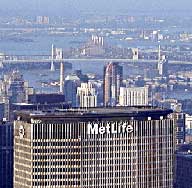 |


|
 |
 |
 |

Appeals Court Upholds MetLife Policyholders'
Right to Opt Out of Nationwide Class Action Settlement
Defendant Is Not Entitled to Injunction to Bar Opt-Out Plaintiffs from Seeking
Certain Discovery in State Court Action

Consumers who opted all of their claims out of a nationwide class action
settlement involving MetLife cannot be barred from fully prosecuting
their individual cases. |
JENNIFER R. SENTIVAN
New Jersey Lawyers Weekly
March 1, 2004
The District Court properly denied an injunction
to bar the opt-out plaintiffs of a federal MDL class action alleging illegal
sales practices from conducting discovery of the defendant's nationwide sales
practices, including information that specifically related to litigants from the
MDL case, in their state court action.
In December 1999, Metropolitan Life Insurance
Company settled an MDL class action that alleged illegal sales practices.
Opt-out plaintiffs of the class action filed their own individual suits in
Pennsylvania state court against MetLife that alleged improper sales practices.
The opt-out plaintiffs were allowed to conduct discovery of MetLife's nationwide
sales practices, including information that related to litigants in the MDL
case, in the state court proceedings because the sales practices were
potentially relevant to the opt- out plaintiffs' individual claims.
In October 2001, MetLife applied in the U.S. District Court for the Western
District of Pennsylvania for an injunction to bar the opt-out plaintiffs from
conducting such discovery or from asserting a claim that related to the alleged
illegal nationwide practices. MetLife asserted that the discovery would disturb
or relitigate the MDL case.
The magistrate judge issued a report and recommendation for an injunction
because the opt-out plaintiffs essentially were relitigating the sales practices
covered by the settlement in the MDL case. However, on reconsideration, the
judge reversed his recommendation. The judge found that, while the opt-out
plaintiffs might have "abused" MetLife "through overbroad
discovery requests and allegations in their complaint," the opt-out
plaintiffs had discrete individual claims. Therefore, the judge found that it
was up to the state court to determine whether the specific discovery requests
were relevant to their claims.
The District Court adopted the magistrate judge's report and recommendation.
MetLife appealed, and the opt-out
plaintiffs cross-appealed. The Third Circuit affirmed.
The Third Circuit first noted that, under the Anti-Injunction Act, a federal
court may not enjoin a state court proceeding "except as expressly
authorized by Act of Congress, or where necessary in aid of its jurisdiction, or
to protect or effectuate its judgments."
MetLife argued that the District Court had the authority to enjoin the opt-out
plaintiffs' claims because the injunction was necessary either to aid the
District Court's jurisdiction over the MDL case or to prevent relitigation of
the MDL case.
As to MetLife's argument that the injunction would aid the District Court's
jurisdiction, MetLife relied on In re Prudential Ins. Co. of Am. Sales
Practice Litig., 261 F.3d 355 (3d Cir. 2001). However, the Third Circuit in
this case found that Prudential was distinguishable. The plaintiffs in Prudential
were parties to the settlement of the class action because they did not opt out
all of their claims. However, in this case, the opt-out plaintiffs had opted out
all of their claims; therefore, they were not parties to the MDL case
settlement. While MetLife tried to downplay this distinction, the Third Circuit
concluded that a close reading of Prudential made it clear that the
Prudential plaintiffs' participation in the settlement was the dispositive
factor in that case.
MetLife argued that the Third Circuit should look beyond the facts of Prudential
and should "embrace a larger goal of protecting class action defendants
from having to repeatedly defend against allegations relating to claims they
have already settled." While MetLife claimed that Prudential endorsed
this goal, the Third Circuit in this case found that MetLife took the comment
out of context.
As to MetLife's argument that the injunction would prevent the opt-out
plaintiffs from relitigating the settled claims, the Third Circuit concluded
that the opt-out plaintiffs were not relitigating the settled claims at all.
Rather, the court found that the opt-out plaintiffs were "suing over their
own alleged mistreatment" by MetLife, "not over someone else's
claim."
"In short," the Third Circuit found that MetLife had not pointed to
any case law that authorized an injunction against opt-out plaintiffs like the
ones. in this case, who had "consciously and purposefully refused to join a
class action settlement." The court found that the case law relied on by
MetLife all dealt with plaintiffs that were distinguishable from the opt-out
plaintiffs in this case. Thus, the Third Circuit upheld the denial of the
injunction.
Finally, the Third Circuit addressed the opt-out plaintiffs' assertion that the
District Court had erred by refusing to reject the magistrate judge's
"unsupported dictum" that they had committed "discovery and
pleading 'abuse' in their state court cases." The opt-out plaintiffs argued
that the District Court was not authorized to criticize their conduct in state
court and that the District Court's criticisms were "clearly erroneous as a
matter of fact."
The Third Circuit found that the comments clearly were dicta; therefore, there
was no finding of fact to review, "let alone to declare clearly
erroneous." In any event, even if the comments were findings of fact, the
Third Circuit concluded that the opt-out plaintiffs' appeal on this issue still
was not appropriate because the case law provides that federal courts "have
not recognized standing to appeal where a party does not seek reversal of the
judgment but asks only for review of unfavorable findings."
For appellant/cross-appellee: B. John Pendleton, Jr. (McCarter & English).
For appellees/cross-appellants: Leslie A. Brueckner (Trial
Lawyers for Public
Justice, P.C., Washington, D.C.) and Kenneth R. Behrend (Behrend
& Ernsberger, P.C., Pittsburgh).
|


